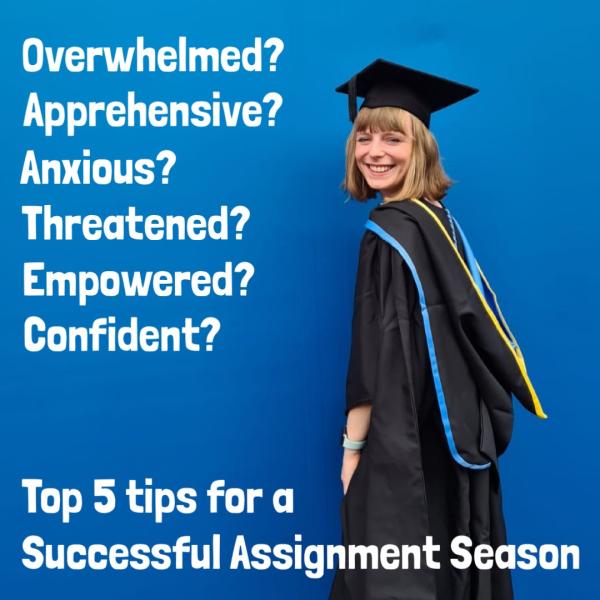Laura Bunce, senior women's health physiotherapist and student favourite Instagrammer shares her top tips for surviving the assessment period
As a physio student, doing well in exams and assignments is crucial to your success. However, balancing all the things that make up your life can feel daunting, and especially so ahead of the exam or assignment period. With the right strategies, you can tackle exams and assignments head-on and still have time to breathe. Whether you’re gearing up for a big exam or working through an assignment, these tips will hopefully help you stay on top of things and perform your best.

1. Master Time Management
Effective time management is the foundation of success in medical school. Between lectures, placements, assignments, and exams, it’s easy to feel overwhelmed. Break down your tasks into smaller, manageable chunks and use tools like planners, calendars, or apps to stay organized. I like to have a general to do list where, depending on the amount of time I have, I will pick three to four things to achieve in that session to help to reduce the feeling of overwhelm. Make sure you prioritise what needs to be done and build a study schedule that’s both realistic and flexible – and leave yourself enough time to allow for the inevitability of plans which change. As someone with a neurodiverse brain, I don’t get too bogged down in sticking to a rigid schedule. Starting with working out what I need to cover, I then find the time to slot in the things I need to achieve roughly, but allowing the flexibility needed to help me to stay motivated, and without it feeling overwhelming. I also love my visual timer, for helping to keep me on track- whether this is reigning in when I’ve become absorbed in what I am doing, or helping me to push on through for the final few minutes of a task.
2. Active Learning Over Passive Reading
Instead of just reading through your notes and textbooks, try actively engaging with the material. Write summaries in your own words, teach someone else what you’ve learned, or solve case studies. This will help you actually understand and remember the content better. Plus, it’ll make your study sessions way more interesting than just passively reading through pages. Get creative; everyone’s brains are different. You should have access to a variety of resources, such as online platforms, textbooks, videos, and apps designed to enhance learning. Use these resources to supplement your studies, and make revision more interesting. Whether you like flashcards or using apps such as anatomy TV, find what works for you and incorporate that into your learning practises.
3. Practice, Practice, Practice
Practicing with past papers and sample questions (if available) helps familiarise you with the exam format and the types of questions you may encounter. The more you practice, the more you’ll get the hang of the format and it’ll also show you which areas you still need to focus on. This is especially handy for OSCE type exams, where practising the ‘doing’ of the assessment whilst explaining it to your model will help you feel more at ease for when you are in a more pressurised environment. Even if you don’t have access to past questions, you know what the key clinical skills are that you might need to be able to demonstrate. Start by practising these out loud, and then challenge yourself to consider how your treatment choice may change depending on what you find on assessment.
4. Take Care of Your Mind and Body
You won’t perform well if you’re running on empty. It’s easy to fall into the trap of studying non-stop, but you’ll actually retain more if you take care of your body and mind. Plus, regular breaks and finding your stress-relief activities will keep you from burning out. Finding that balance will be just as important when you graduate.
Make sure you’re practising what you would suggest to patients: getting enough sleep, eating healthy food, and exercising regularly are all vitally important.
5. Collaborate with Peers
Don’t hesitate to ask for help if you're struggling with a topic or concept. Whether it’s a lecturer, your tutor, or a fellow student, seeking clarification early can save you time and prevent confusion later on. Studying physiotherapy is challenging, and reaching out for support is not a sign of weakness but a proactive approach to learning. Additionally, study groups can be a valuable resource. Collaborating with classmates allows you to quiz each other, explain things you’re struggling with, and reinforce each other’s learning. Find a study group that keeps everyone motivated and focused. Try to stay boundaried to avoid this turning into a socialising opportunity instead.
Conclusion
Succeeding in exams and assignments as a physio student isn’t about working harder—it’s about working smarter. By mastering time management, using active learning techniques, seeking support, and taking care of your health, you’ll be better equipped to navigate the demands of physio school and excel in your academic journey.
Remember, you’ve got this! Stay consistent, keep learning, and before you know it, you’ll be one step closer to becoming the physio you want to be.
Check out more of Laura's fantastic study tips on Instagram @lauraphysiostudies and the CSP resources available to support your studies
Number of subscribers: 1